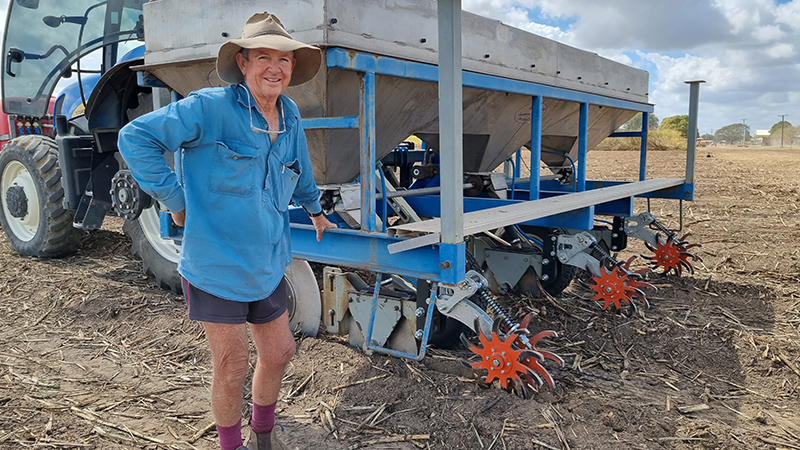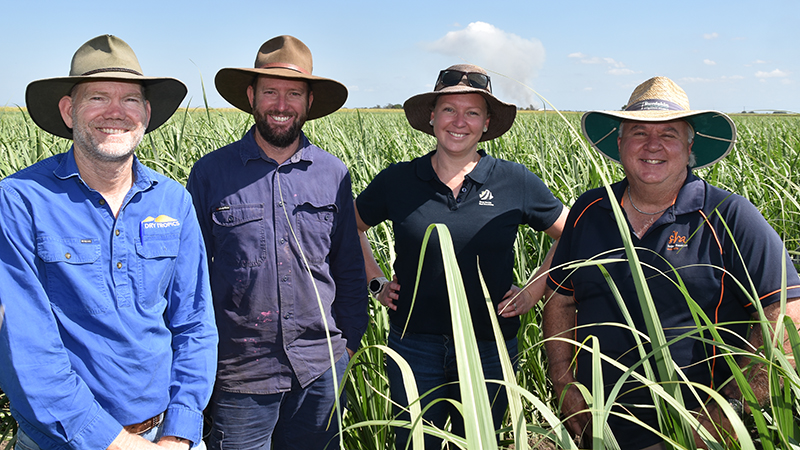Project Bluewater 2
(Part of the Lower Burdekin Water Quality Program delivered by Farmacist Pty Ltd.)
AT A GLANCE
-
170 projects across 103 farms involving 60 landholders managing 11,396 ha.
-
Waterway Risk Unit reduction totalling 1,607,971 (exceeding the target by 278%), equating to an overall reduction in risk to waterways of 26%.
-
6 data-generating trials conducted with 140 water samples taken.
-
75 growers managing 169 farms engaged to deliver pesticide plans.
-
20 booms rebuilt in-house to help growers apply chemicals more efficiently and effectively.
Grower Joe Quagliata, left, with Farmacist Project Officer Chris Doblo.
JOE QUAGLIATA
Third-generation cane grower Joe Quagliata received expert advice on optimising pesticide use, saving him money and minimising deep drainage runoff.
Airville farmer Joe Quagliata doesn’t like using pesticides on his crops, but knows they are a necessary evil to prevent grasses and vines taking over and reducing yield.
“The less chemicals I apply, the better, but it has to be done smartly and safely,” Joe said.
Joe joined Project Bluewater, and worked with local agronomy company Farmacist to determine whether his practices could be improved to benefit his bottom line and the environment.
Grower Joe Quagliata.
New booms improved efficiency.
He accessed a range of support, including a tailored pesticide management plan, spray rig assessment and calibrations, and assistance with recording application data, to comply with legal requirements.
Joe said the advice received, combined with the results of strip trials, gave him the confidence to simplify his pesticide mix from several different chemicals down to one.
“I had the opportunity to learn more about the chemicals I was using, and how to apply them properly,” Joe said.
“I do believe I’ve gained a lot more knowledge about my farming.”
Farmacist’s Chris Doblo said although the window for farmers to treat their crops was relatively short, it wasn’t necessary to apply extra pesticide “just in case.”
“Farmers are often advised to use brews that have six or seven chemicals in one tank for that one spray application,” Chris said.
“Instead of throwing the kitchen sink at the problem in the hope something will stick, we have found that getting the chemistry and application right can achieve positive water quality outcomes without negative effects on yields or input costs.
“The pesticide Joe now uses sticks to organic matter and is highly unlikely to reach the water table, so we have greatly reduced the water quality risk.”
Joe said being part of the project had benefited his business and said there were many other Lower Burdekin farmers like him on a similar path.
“I am spending less money on pesticides because of the trials,” he said.
“I do believe attitudes have changed.
“A lot of people are more wary of costs now, so they’ve got to start adopting these changes, otherwise they’re going to get left behind and be out of pocket. It’s about looking at ways to save money but still be productive at the same time.”
FURTHER READING
LOWER BURDEKIN WATER QUALITY PROGRAM
Stool Zippas

NQ Dry Tropics’ Major Grants project encouraged growers to invest in equipment, technology or agronomic services to reduce the amount of nitrogen fertiliser applied to their crop. Some opted for Stool Zippas .
READ MORE>>
Innovations Day

Lower Burdekin cane growers heard about the “latest and greatest” innovations available to improve efficiency, profitability and sustainability at a Field Day on Aaron Linton’s Home Hill farm recently.
READ MORE>>
Program home

Between 2020 and 2024, more than 100 cane growers have improved irrigation, nutrient and pesticide management, resulting in widespread practice change and significant water quality improvements.
READ MORE>>
Irrigation project

Wilmar Sugar and Renewables and Ross and Lisa Parker’s farms are the subjects of two case studies under this project.
READ MORE>>
Precision-Decision

Giving growers a better understanding of soil types, better control over application of soil ameliorants and better data for long-term decision-making on-farm.
READ MORE>>
Major Grants

Innovation has long been a driver of improved profits, improved application of water, fertiliser and pesticide on sugar cane crops. Innovations that lead to increased profitability and resilience for the grower and reduced runoff from farms for the Great Barrier Reef are the things that excite us.
READ MORE>>



